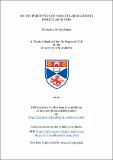Files in this item
On the perception of monocular regions in binocular scenes
Item metadata
| dc.contributor.advisor | Harris, Julie | |
| dc.contributor.author | Zeiner, Katharina Maria | |
| dc.coverage.spatial | xi, 267 | en_US |
| dc.date.accessioned | 2013-06-10T11:46:06Z | |
| dc.date.available | 2013-06-10T11:46:06Z | |
| dc.date.issued | 2012 | |
| dc.identifier.uri | https://hdl.handle.net/10023/3650 | |
| dc.description.abstract | Our two forward facing eyes supply the visual system with slightly different versions of the world around us. These slight differences in the two retinal images are used to obtain depth information about a visual scene. Conventionally, it has been assumed that points in one retinal image that do not have corresponding points in the other image are treated as noise. However, if one object is partially occluded by another, monocular points and regions occur. While it is, by now, established that we do not ignore geometrically plausible monocular points and regions, we know much less about our percept of such regions. So far it has not been studied how our percept of monocular regions compares to that of binocular regions and how well we are able to use the information contained in them. In this thesis I explore our percept of such monocular regions and ask how we treat them in relation to their binocular surround. Using classical psychophysical methods as well as reaction-times and eye-tracking data, I find that we are perfectly capable of using monocular regions to interact with them and to arrive at a stable, seemingly complete percept of them. Sometimes our performance even benefts from the presence of a monocular region. However, this breaks down when we are asked to integrate the information contained in monocular regions with information in binocular regions. The experiments in this thesis show that even though we do not ignore monocular regions and can, if we have to, interact with them, we show a strong preference towards relying on binocular information when given the option. | en_US |
| dc.language.iso | en | en_US |
| dc.publisher | University of St Andrews | |
| dc.subject.lcc | QP487.Z4 | |
| dc.subject.lcsh | Vision, monocular--Experiments | en_US |
| dc.subject.lcsh | Binocular vision--Experiments | en_US |
| dc.title | On the perception of monocular regions in binocular scenes | en_US |
| dc.type | Thesis | en_US |
| dc.accrualMethod | Visual perception | en_US |
| dc.type.qualificationlevel | Doctoral | en_US |
| dc.type.qualificationname | PhD Doctor of Philosophy | en_US |
| dc.publisher.institution | The University of St Andrews | en_US |
| dc.identifier.doi | https://doi.org/10.17630/10023-3650 |
This item appears in the following Collection(s)
Items in the St Andrews Research Repository are protected by copyright, with all rights reserved, unless otherwise indicated.

